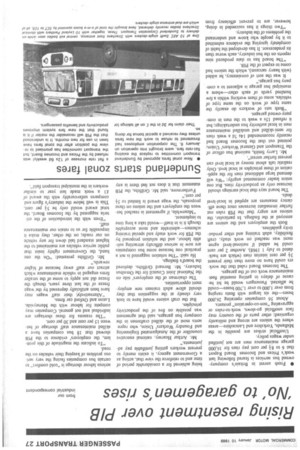Rising resentment over MB 'No` to garagemen's rises
Page 29

If you've noticed an error in this article please click here to report it so we can fix it.
from our industrial correspondent • Fresh unrest in Britain's companyowned bus services is feared following last week's Prices and Incomes Board Report that 6 to 81 per cent pay rises for 16,000 garage maintenance men are not justified under wages policy.
Unofficial strikes are possible in the Midlands, Yorkshire and Lancashire—areas where the unions are strong and militantly organized; other parts of the country may face unofficial go-slows, work-to-rules or aggravating "non-co-operation" protests.
About 56 companies operating 26,000 buses—the six largest with fleets ranging from over 1,000 to over 1,700 buses—could be affected. Passengers would be hit because of delays in getting essential fleetmaintenance work out of the garages.
The Incomes Board ruled that the workers could have no more than their present
31 per cent interim rises (which are back dated to July 1 1968). Another 2 per cent could be added if national-level agree ment was reached on work study, craft flexibility, adult training and other productivity guidelines.
Both the employers and the unions are annoyed at the findings. ln particular, the unions are angry that the PIB rules out further immediate increases once these efficiency measures are applied in local-level deals.
The board says that local earnings should increase only as productivity rises. But one union leader commented angrily: "We will demand large additional rises for the application of these principles at local level. Only realistic talk about money at local level can prevent further unrest".
Mr. Larry Smith, national bus officer of the Transport and General Workers' Union, pointed out that the Incomes Board had recently recommended 14s 7d a week rises for semi-skilled and unskilled maintenance men in local authority bus undertakings; but it refused 15s a week to the men in company-owned garages.
"Both sets of workers do exactly the same type of work on the same type of vehicles, some of them working within a few hundred yards of each other—where a municipal bus garage is adjacent to a company bus garage."
It was the sort of consistency, he added (with heavy sarcasm), which the unions had come to expect of the PIB.
"The board has to date produced nine reports on the bus industry, each worse than its predecessor. It has developed the habit of completely ignoring the evidence submitted to it by people who know and understand the problems of the industry.
"Two things it has succeeded in doing, however, are to prevent efficiency from being achieved for a considerable period of time and to reinforce the view that, acting as a Government agency, it exists merely to prevent workers getting justifiable pay adjustments."
Mr. Arthur Hearsey, national executive councillor of the Amalgamated Engineering and Foundry Workers' Union, who represents most of the skilled craftsmen in the company bus garages, said that agreement was possible on five of the productivity principles.
But the craft unions would have to look very closely at the suggestion that they should allow adult trainees new employment opportunities.
The chairman of the employers' side on the National Joint Council for the Omnibus Industry, Mr. Bernard Griffiths. deplored the board's findings.
He said: "The solution suggested is not a practical one because some bus companies are now in serious difficulty attracting suitable labour, and the solution proposed by the PIB for work study and special training schemes—admirable and most acceptable though it is in itself—would take a long time to implement.
"Meanwhile, if agreement is reached between the employers and the unions on these proposals, the wage award is limited to 5+ per cent."
Furthermore, said Mr. Griffiths. the PIB statement that it does not feel there is any serious labour shortage is "cold comfort" to certain bus companies facing the very serious problem of keeping their vehicles on the road.
"To indicate the magnitude of this problem, the employers' evidence to the PIB showed that 18 bus companies have a skilled maintenance staff shortage of between 15 per cent and 30 per cent.
"The reasons for these shortages are individual and not general. Companies may compete for labour with the Merseyside, Luton and Oxford car firms.
-Alternatively; their staff wages may have been artificially depressed by the wage
freeze of the last three years, though the freeze did not apply to some of the smaller firms engaged in vehicle maintenance which attract our staff away because of higher rewards."
Mr. Griffiths protested: "On the one hand, the Government rightly insist that public service vehicles are maintained to the highest standard laid down for any vehicle on our roads; on the other, they make it impossible for us to retain our maintenance staff.
"Even with the introduction of the criteria suggested by the Incomes Board, the total award would only be 51 per cent. This is well below the industry's figure and compares unfavourably with the award of £1 a week made last year to similar workers in the municipal transport field".








































































































